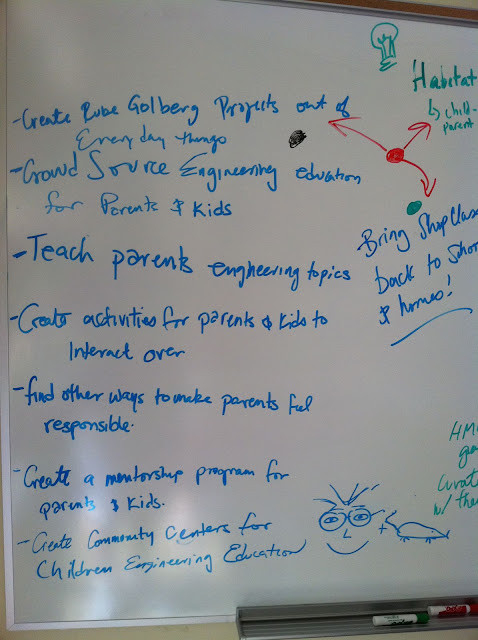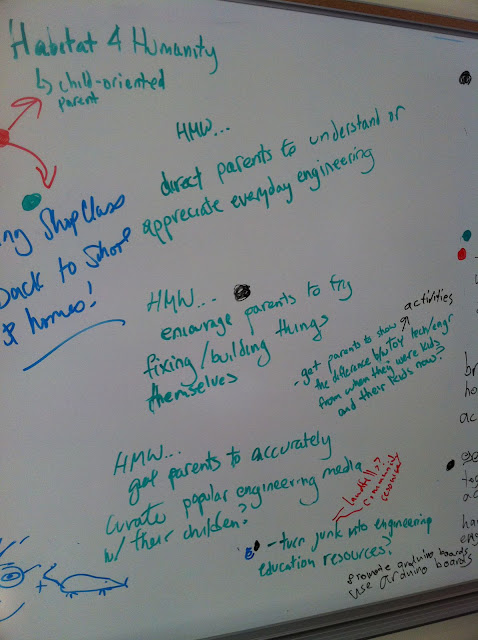A How Might We is a statement that asks "how might we" do something. In other words, it phrases a subset of the needs identified in the point of view as a question. The how might we is narrow to make room for the broad and varied solutions that we might brainstorm as an answer to that "how might we" question.
The How Might We statements that we discussed were How Might We:
- Activities
- create Rube Goldberg projects out of everyday things
- create activities for parents and kids to interact over
- habitat for humanity -- child / parent oriented
- get parents to accurately curate popular engineering media with their children
- promote arduino boards
- use arduino boards
- get parents to show the difference between toys or activities with regard to technology and engineering from when they were kids to now
- make hobbies that teach engineering without requiring a science background
- make parents feel safe doing more 'dangerous' engineering projects with kids (ie, soldering)
- get parents and kids involved in a specific type of engineering project
- CS
- circuits
- fabrication
- cars
- wood
- metal
- engines
- solar
- energy
- Community
- crowdsource engineering education for parents and kids
- create a mentorship program for parents and kids
- create community centers for children engineering education
- bring back shop class!
- bring teachers to homes for engineering activities
- have vacations involving engineering education
- leverage the Maker's Faire infrastructure to help excite families around this topic
- help families share their excitement with others
- Personal Expression
- make projects involving personal experience or self expression
- help kids and parents tie in their own interest for extra motivation
- Use Everyday Stuff
- direct parents to understand or appreciate everyday engineering
- encourage parents to try fixing or building things themselves
- turn junk into engineering education resources -- landfill? community resources?
- encourage kids and parents to break stuff to see how it works
- Etc
- get kids to teach parents engineering
- excite kids and parents with no current stimulus
- find other ways to make parents feel responsible
- get uninterested kids interested
- reach out to this group
- educate parents on why this is useful or important for their children to know
I especially liked the ideas about creativity, using everyday junk, using, hobbies, and using communities. One thing that I would have liked to explore more but that my group wasn't interested in was the idea of getting kids to teach parents. Section leading in computer science and teaching a class on Linux have both been incredible learning experiences for me, and I would be interested to see how much young kids can learn by teaching.
Some of the interviews that I conducted:
MS:
There are already science books, etc
I like to spend time with kids. I respond to their demands
Your service needs organization by age and subject
You need to make sure that your service is proven effective by educational theory. Otherwise, your product will be like Baby Einstein, which doesn't actually work.
MK:
Parents feel responsible to be able to teach their kid stuff. it's weird when the kid knows more than me because then I'm not the expert. I would want something that makes it explicit that we're both learning -- that I'm not expected to be the expert.
I don't want something where I get a separate set of information and have to fake knowing everything.
KC:
I don't let my partner teach math. I had a mathy background even though I got a PhD in the humanities.
I try to make it fun -- "playing math."
Games work well -- Yahtzee teaches a 6 year old how to multiply.
The games that I play with them are the ones that I played as a kid
I adapt to my kids' interests. I make educational experiences out of random things that they're interested in like astronomy or gravity.
Pictures of our How Might We's:




No comments:
Post a Comment